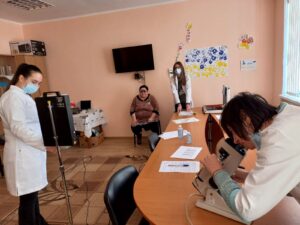Join a powerful, unprecedented alliance for better eye health for all.
Join IAPB-
Choose an alternate language here
The war in Ukraine began on a day like any other.
On February 24, 2022, the LOW VISION Center in Moldova, a non-governmental organisation that delivers medical and social rehabilitation services to people with visual impairments, planned to hold a routine vision screening activity at a male prison two-hours east of the capital city of Chișinău. Team members began their drive under normal, if perhaps slightly anxious, circumstances. By the time they reached the prison, Moldovan authorities had declared a state of emergency and reported that the Russian invasion and attacks in Ukraine were resulting in mass population displacement and pushing thousands of Ukrainians to flee their country and cross into Moldova. All normal activity stopped, and the team immediately returned to the capital to develop an emergency plan to address the continuity and expansion of care in a context that would ultimately reach a scale unprecedented in Europe since World War II.
In the days that immediately followed, and at the direction of government authorities, the LOW VISION Centre connected with civil society partners and the United Nations High Commissioner for Refugee (UNHCR) Disability Task Force to identify the ophthalmologic needs of refugees and to provide medical care. Since there was no electronic evidence system in place, LOW VISION worked with patients, caretakers and humanitarian actors to coordinate a rudimentary system of monitoring and referral channels across medical, social and education sectors to aid in the delivery of critical services. Collective action and open communication ensured that 1/5 of refugee patients were able to receive follow-up care.

In April 2022, two low vision Ukrainian sisters with Stargardt disease from Odessa region were brought to the Centre. An ophthalmologist and optometrist provided them a CCTV, a comprehensive examination and secured a follow-up visit. This was the first time in their lives that they received any assistive devices and the first time the members of their family had a simulation exercise on low vision. After 9 months, the Centre remains in touch with the family and receive regular videos on the use of the CCTV for the rhinestones applications and text messages that convey the transformative power of healthy vision in even in the most difficult of circumstances:
“Good afternoon, I want to say a huge thank you for helping our girls to continue their studies with their low % of vision. They can now practice our favorite hobby”.
More than 620,000 Ukrainian refugees fled across the border and more than 100,000 remain in the Republic of Moldova. Over the past year, the LOW VISION Centre has had the ability to look closely in the eyes of some of these men, women and children. They saw pain, disillusionment, hope, gratitude and love. The LOW VISION Center will continue to carry out its mission to deliver quality eye care and social rehabilitation services to people with visual disabilities currently living in Moldova and remain hopeful that peace will prevail soon.
In 2022, IAPB formed the Ukraine Eye Health Response Group to address gaps in humanitarian health services and provide a coordinated sector strategy to ensure the continuity of care and prevention of long-term visual disability for displaced persons in Eastern Europe. Participating organizations included: The LOW VISION Centre, World Blind Union, European Society of Cataract and Refractive Surgeons (ESCRS), Christian Blind Mission (CBM), OneSight Essilor Luxottica Foundation, Royal National Institute of Blind People (RNIB), European Blind Union, Blind Veterans UK, RestoringVision, and individual medical providers. Through collective action and networking, members of the group were able to facilitate observations for Ukrainian medical providers to build local capacity, ship over 300,000 spectacles for displaced Ukrainians and equip over 120,000 displaced or shock-affected persons with assistive devices.
The situation in Ukraine is only one of many humanitarian crises currently taking place. Deepening conflict, widespread hunger and major climate disasters has led to more than 1% of the world’s population being forcibly displaced, more than double the amount of people 10 years ago. Building on lessons learned from the Ukraine Response Group, IAPB will be initiating a new Humanitarian Response Interest Group focused on the provision of eye health services in humanitarian contexts – specifically in situations with chronically displaced populations and conflict or disaster related disruptions to health care infrastructure and services. The Interest Group will provide leadership and advocacy for increased adoption and action on priority matters, including strengthening of health systems and technical guidance relating to the challenges of implementing programs and delivering quality eye health services in fluid and volatile operating environments.
If you are interested in joining the Humanitarian Response Interest Group, please contact IAPB Senior Policy and Advocacy Manager Brooke Blanchard [email protected]